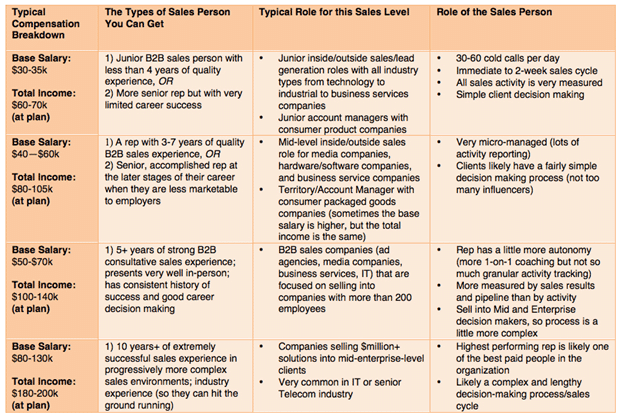
BY JAMIE SCARBOROUGH
One of the questions we hear all the time from business owners is how much they should pay their salespeople. If they pay too much, the cost of sale is too high and profitability goes down. If they pay too little, they cannot get high-level talent and are vulnerable to high turnover.
So how do you figure out what salespeople are worth? The most popular compensation model is one that’s around 50% salary/50% commission. This is especially common for “hunting” roles that require new business development. A higher base and lower commission is the norm for “farming” roles, in which the rep’s main focus is growing existing client revenue.
Here, based on our company’s work over the years helping hundreds of companies find, choose and equip their sales teams, are some rules of thumb that you should keep in mind:
- Commission plans should drive the behaviour your company is looking for. For example, if you want more new business, the commission plan should be weighted toward hunting achievements.
- Avoid limiting the commissions a salesperson can make: a great business developer will want to know that their income is as high as the effort they put in.
- Remember that no matter what the salary, there should always be a clear, attainable sales target—attainable through reasonable, not superhuman, effort.
- If you’re hiring outside salespeople, they’ll require expense reimbursement related to business travel and client engagement. These expenses should be accounted for in your cost of sale analysis while developing the commission plan.
Here’s a more detailed breakdown of what you should expect from a given sales hire at a specific compensation range:

The base salaries in each range vary by a significant amount. At the highest level, a sales rep might be getting $80,000 or they might get $130,000. So, how do you stop yourself from making a $50,000 mistake?
These are some of the variables that account for big salary swings:
1. Industry type
No matter how much experience a rep has, if an industry has a very high cost of sale, the salesperson is going to earn a lower base salary.
2. Brand recognition
Is your brand recognizable? In other words, will it do most of the work for you? Companies with a strong brand know that’s all they need to get in the door. Because their sales are marketing-driven, the big moneymakers at those companies will be the marketers. Companies with zero brand awareness will need a more experienced (read: more expensive) sales team.
3. Scarcity of talent
Western Canada, because it boasts an unemployment rate well below the national average, especially in Alberta and Saskatchewan, is a seller’s market. Those with strong sales skills can sell them at a higher price. From Ontario eastward, on the other hand, even though there are more jobs and more talent overall, the unemployment rate is higher, making the going rate for a good sales rep more reasonable.
All this aside, here’s one piece of advice: the one thing you never want to compromise on is talent. Experience, on the other hand, is something you may have to compromise on to align with your budget.
Remember that experience isn’t just measured in number of years on the job. In order to earn that higher pay, a sales rep needs to have been working in one lane. If they’ve jumped from industry to industry, suddenly their experience doesn’t mean much. The biggest variable—the one that could mean the difference between $120,000 and $180,000—is how specific a rep’s experience is to your industry; how well they know your competitors and the industry players and how much influence they have with them.
If you hire someone with less experience, you’ll get away with paying them less, but you’re taking a risk. However, if you think they have the talent to be a great sales rep, you can always train them on the particulars of your industry. What you can’t teach are drive, personality and smarts.
